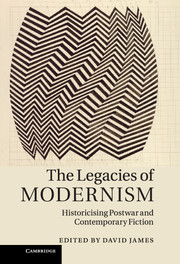Book contents
- Frontmatter
- Contents
- Notes on contributors
- Acknowledgements
- Introduction: mapping modernist continuities
- Part I Early legacies: inheriting modernism at mid century and beyond
- Chapter 1 Not what it used to be: nostalgia and the legacies of modernism
- Chapter 2 H. E. Bates, regionalism and late modernism
- Chapter 3 Moving beyond modernism in the fiction of B. S. Johnson: charting influences and comparisons
- Part II Modernist aesthetics in transition: character, perception, innovation
- Part III Reassessing the ethics of modernist fiction
- Part IV Modernism's global afterlives
- Epilogue Finding the dreadfully real
- Index
- References
Chapter 1 - Not what it used to be: nostalgia and the legacies of modernism
from Part I - Early legacies: inheriting modernism at mid century and beyond
Published online by Cambridge University Press: 05 November 2011
- Frontmatter
- Contents
- Notes on contributors
- Acknowledgements
- Introduction: mapping modernist continuities
- Part I Early legacies: inheriting modernism at mid century and beyond
- Chapter 1 Not what it used to be: nostalgia and the legacies of modernism
- Chapter 2 H. E. Bates, regionalism and late modernism
- Chapter 3 Moving beyond modernism in the fiction of B. S. Johnson: charting influences and comparisons
- Part II Modernist aesthetics in transition: character, perception, innovation
- Part III Reassessing the ethics of modernist fiction
- Part IV Modernism's global afterlives
- Epilogue Finding the dreadfully real
- Index
- References
Summary
I
‘Was the pound really worth twenty shillings, and were there parties every night and hansom cabs?’ asks Peter Quennell in A Letter to Mrs. Virginia Woolf (1932). Quennell, of course, was by no means the only contemporary to record memories of ‘the placid pre-war universe’ and ‘how tranquil and olympian it must have been’ – until the outbreak in 1914 of ‘the War to End Wars and so good-bye’. Clive Bell recalled in 1917 ‘society before the war . . . curious, gay, tolerant, reckless’. C. E. Montague suggests of the period, in Disenchantment (1922), ‘surely there never was any time in the life of the world when it was so good . . . to be alive’. Richard Aldington describes in Death of a Hero (1929) ‘the feeling of tranquil security which existed, the almost smug optimism of our lives’ during the ‘golden calm’ before the war. In the first volume of Parade's End (1924), Ford Madox Ford regrets the loss of the ‘perfectly appointed . . . luxuriant, regulated . . . admirable’ characteristics of this pre-war world. Throughout the modernist period, writers continued to experience strong incentives to share these feelings. The war itself, or the disenchanted twenties which followed, offered straightforward encouragement to look back to a happier ‘Edwardian’ past (usually seen as lasting from 1900 until 1914, though Edward VII died in 1910). The period's appeal to later imagination also encouraged development of fictional forms through which its pleasures and securities might be revisited or recreated.
A paradigm for aspects of modernist vision, and modernist narrative strategies, therefore appears in Rebecca West's The Return of the Soldier (1918). Shell-shocked in 1916, its hero returns completely, in his mind, to an idyllic island retreat actually visited in 1901, and figured in seductive summer twilight throughout the extended analepsis of the novel's third chapter. Other modernists likewise returned to a relatively placid, harmonious Edwardian scene, either in parts of their work – the ‘airy sunny garden’ described in the first part of Virginia Woolf's To the Lighthouse (1927), for example – or in whole novels. James Joyce's meticulous description of Dublin on 16 June 1904, throughout Ulysses (1922), crystallises a key moment in his private experience, but also, more generally, a public life and cityscape permanently changed by the Easter rising of 1916. Marcel Proust devotes much of À la recherche du temps perdu (1913–27) to recreating the leisured experience of the belle époque. He also altered the novel's setting, during the process of composition, to emphasise how utterly this experience had been obliterated by the Great War, along with the childhood landscape Marcel fondly recalls. The idyllic Guermantes of the novel's early stages becomes ‘this now ravaged countryside, where vast battles are fought to gain possession of some path, some slope which [he] once loved’. Much the same inclination to look back at the sunnier landscape of the belle époque, in full knowledge of its ravaging in the war, shapes other 1920s novels such as Woolf's Mrs. Dalloway (1925) or Ford's tetralogy Parade's End (1924–8).
- Type
- Chapter
- Information
- The Legacies of ModernismHistoricising Postwar and Contemporary Fiction, pp. 23 - 39Publisher: Cambridge University PressPrint publication year: 2011



